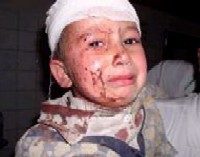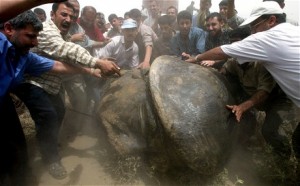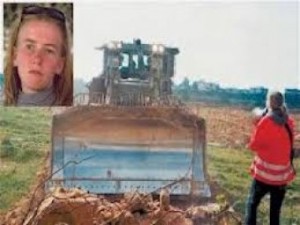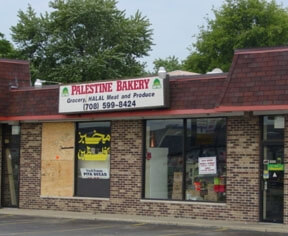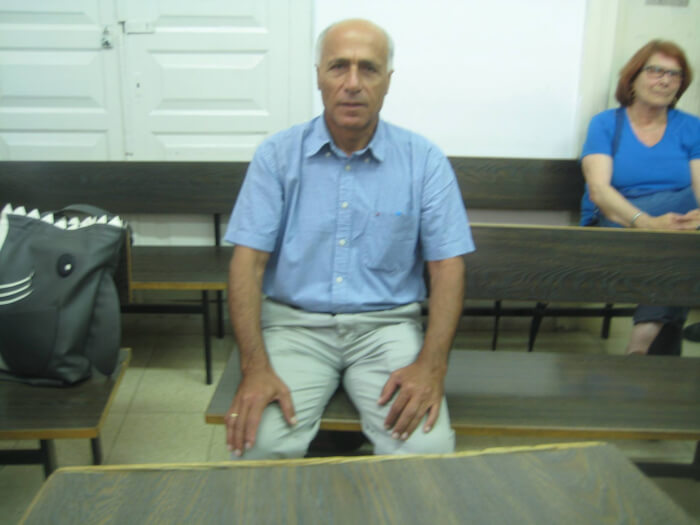By Dezeray Lyn
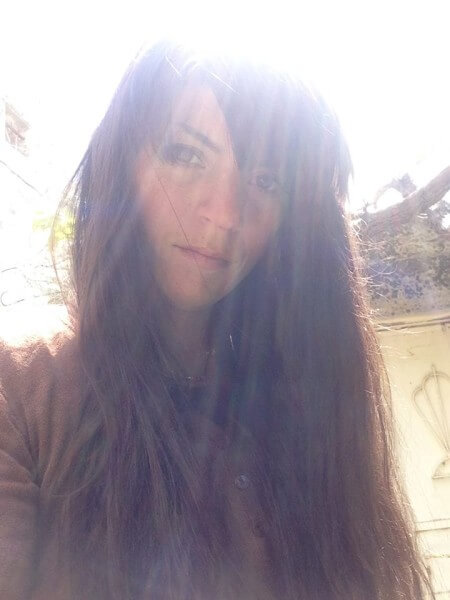
“All of the halls were lined with beds preparing for incoming war casualties. Long, long halls lined with little tables and beds, little tables and beds. The sheets were white and pressed. They wouldn’t be for long.”
Throughout the globe, humanitarian aid workers and allies to embattled civilian populations trickle into conflict zones to pull stories from the wreckage and slip them silently across borders to sever the isolation of the west to the rest of the world being terrorized at its’ behest.
As the skies over the Iraqi capital of Baghdad lit up with the engagement of the US aerial assault against the already ravaged Iraqi populous, as US military targets were rocked in Mosul and as plumes of smoke saturated the skies above the city of Kirkuk, the six story al Fanar hotel in Baghdad held the remnants of a severely dwindled collection of international peacekeeping members from the Chicago based Voices in the Wilderness.
Grandmother, activist and community organizer Bettejo Passalaqua was one of them.
As United Nations inspectors and foreign diplomats fled the capital city, along with those international aid workers operating in a humanitarian capacity, around 30 members of Voices in the Wilderness and Christian Peacemaker Team resolved themselves to stay. As the hour of destruction grew closer, self-designated ‘human shields’ who had bussed in from places of safety prepared themselves to guard critical infrastructures with their bodies. The final warnings given for emergency evacuation before US aggressions, in the form of a swift and massive bombing campaign were enacted, in these cases, fell on deaf ears.
The US’s 2003 shock and awe campaign was about to commence.
The indomitable spirit of the Iraqi people who have endured crippling, murderous, US imposed sanctions, countless years of war, brutality and nefarious, enduring assault is universal truth. The outrageously criminal and repugnant US military assault on the people of Iraq is universal truth. This is a story of one of those who bore witness to the travesty of war.
“Why did I go to Iraq? Because I was helpless to do anything here. Normal channels like demonstrations, writing politicians, writing articles, all of it fell on deaf ears and the whole country (America) was just pushing toward war. I felt very responsible, I knew that the war was wrong and I knew that when 911 happened there were going to be people who would suffer horribly and unjustly because of it- and I knew that if I watched the war on tv I would have gone mad. I still believe that.
Originally I was very ignorant. I wasn’t an activist. My thought, literally, was just to fly to Jordan and walk to Iraq if I had to. That’s how determined I was that I would go there and witness what the Iraqi’s were enduring because it was my country that was doing it. I looked for info and found Voices in the Wilderness co-founded by Kathy Kelly; they had been working in Iraq since the First Gulf War. I applied to travel with them to Iraq to break the US imposed sanctions and tell the story of a people and their culture threatened with annihilation.
In Amman where I met with a delegation of other activists for training and the procurement of visas to enter Iraq. After three days we all got our visas and started our journey through the desert to Baghdad.
We arrived late at night. Emerging from the seemingly endless and dark desert into the city of Baghdad was a magical experience. The city was brightly lit up, the avenues were wide and it seemed like everywhere I looked there was some amazing sculpture or monument. I was now there to tell the stories of the Iraqi people, to put a face to the people of Iraq. The majority of Americans looked toward Iraq and could only muster the face of Saddam Hussein.
Most of the delegations VITW brought in were meant to come in for a couple weeks to a month and then get the stories out. But I knew when I went… I knew that I would stay. I think the following day we had our first meeting with the many different delegations. Kathy went around to everyone in the room and asked how long they planned to stay and I said indefinitely. That’s the first time I spoke on my interior knowledge that I wasn’t going to leave. If the United States waged a war on this people, I would place my fate with theirs.
From the moment I arrived, war was always inevitable. In fact for the people of Iraq, war had been inevitable for eleven long years. To illustrate, Amal’s home was created to be a museum of traditional Iraqi art and culture. But one wall was out of place. She explains that when the bridge in back of her home which spans the Tigris was bombed in 1991, this wall crumbled. The wall was replaced by a temporary structure, the intention being to replicate the original when some amount of assurance came that another bombing campaign would not destroy it as well. That was 2003. No such assurance had come yet.
The Iraqi people had been living under the threat of war since the end of the first gulf war as well as the most horrendous sanctions ever to be placed on a population; half a million children died from these sanctions and millions of others were living from the effects of war and sanctions.
I volunteered in a children’s hospital, al Mansour in Baghdad, and witnessed the Iraqi’s trauma of living with these effects. Most of the children were from Basra an area where the majority of depleted uranium was dropped during the First Gulf War by the US. The children had the most hideous tumors, horrible forms of cancer previously unknown to Iraqis. The chemotherapy and other desperately needed medical supplied were denied under the sanctions. At the children’s hospital we began an arts and crafts program for the kids. It brightened the days and gave the mothers a diversion to have someone come in and cheer them up a little bit. I think one of the most horrifying things for me was when we came in with Polaroid cameras to take pictures of the kids and it was a really big hit. They really liked it. One man, whose son was two and a half years old and very close to death in another part of the hospital, carried his son to the ward of the hospital that we were in so he could get a picture of his son while he was still alive. Most heart-breaking was the hope on parent’s faces when we promised them we would tell their stories and share their pictures with the people of the US. It was a hope that the stories and pictures would sway public opinion against the war. I wasn’t so keen to bring the cameras anymore after that. Why? Because those pictures weren’t going to make a difference. To see the hope in those parents’ eyes that the suffering of Iraq’s children would make them refuse to bomb; it was like a lie.
Iraqi families stayed with their loved ones in the hospital and the mother’s did a lot of the nursing; they changed IV’s and sometimes administered meds if the nurses didn’t have time; most of the women also had other children at home, taken care of my relatives in their absence. About a week before the bombing started the hospital administrator called us to tea and told us that the families would have to make the unbearable choice of either leaving their other children during the bombing or to take their ill children home with them which would mean that child’s imminent death.
Just before the bombing started, we went into the hospital and it was just emptied out. There were only two wards of children left; the most critical children, in incubators and such. All of the halls were lined with beds preparing for incoming war casualties. Long, long halls lined with little tables and beds, little tables and beds. The sheets were white and pressed. They wouldn’t be for long.
Hearing the children screaming while going through procedures was horrifying but the silence in the hospital that day was deafening.
Organizations that we had been working with left. Embassies closed. The good byes were very solemn. They thought we wouldn’t make it. We didn’t think we would make it. We expected to die. I was rather lost when I lived.
“It is difficult to live with uncertainty. Most of the Westerners here have only been here for a relatively short time-weeks or several months-the latter being much rarer. And in this short time the difficult truth of the ambiguous and precarious circumstances in which we stand takes its toll and has its outcome in whispered predictions about a future we aren’t really too sure of.
When Bush gave his 48 hour warning, we went to the souk to get shovels and picks and things to help clear out rubble. It was surreal. When the Iraqi’s in the souk got word what we were there to purchase, they began gifting us with all the materials we would need. It was an incredible act of solidarity.
That said, we were aware that we, as Westerners, could become a target for the pent up rage of a people suffering so long under our government. So I wrote to my supporters at home:
“I am here of my own accord, fully conscious of all the risks involved. I believe unequivocally that I am where I am supposed to be and I believe unequivocally that my presence here, regardless of the outcome, will serve some good in time. I do not have to see those results in my lifetime to believe they are a reality.
I also believe unequivocally that it would be a grave mistake to blame anyone in Iraq if harm does come to me…even if it comes to me from Iraqi people. I am a citizen of the country which has waged war against the innocent civilian people of Iraq for 12 years. I am a citizen of the country whose Secretary of State (Madeleine Albright) said the deaths of 500,000 Iraqi children “was worth it.” I am a citizen of the country whose chief of staff of the armed forces (Powell) said he wasn’t interested in the question of how many Iraqis died in the Gulf War. I am a citizen of the country whose president brags about the “shock and awe” bombing planned for a city of 5.5 million, 46% of whom are under the age of 16.
I fully understand if violence comes my way because I am a westerner, and with all my heart I ask that you not blame Iraqi people, in general or particular, if harm comes to me, regardless of the circumstances.
Rather, I ask that you continue your work on behalf of peace and justice for the people here and for all people.
When the first bomb hit, it reverberated through us as though standing next to a cannon. It went on for several hours, 2 explosions being close enough to shake and sway our hotel.
The biggest concern was that there were nine Iraqi children in the hotel with us.
“Last night I was able to get acquainted with two of the families who are staying in our basement shelter. There is a large family-Deva (8 y/o) and Fady (about 14 y/o) with their grandparents, parents and several aunts and uncles. There is also a mother with 2 young daughters, aged 2 and 3. When the bombing began last night, I got out our hospital art supplies and asked the kids to draw some pictures and make paper chains and such. I think it helped to distract both them and myself, but it is shameful that the best our world can offer these children are paper chains in a makeshift bomb shelter.
I can find no beauty in the knowledge that there are generations of children growing up in Iraq for whom war is simply way of life. These children have done no harm. They are entirely innocent. And yet they will at best carry the fright of these dark days with them for life, and at worse they will perish because those who purport to care for their safety think they can bring safety about with bombs.
But we only have the moment, and at this moment these children are beauty in the midst of everything which speaks otherwise, and they are an incentive for all of us to continue the struggle for a world at peace.”
The bombing was relentless. The Iraqis, in order to try and misguide missiles, started letting oil wells burns which released tremendous amounts of black smoke so the whole city was covered with it and the bombing rubble and all the materials in the air from the bombing. For three days we stayed inside the hotel until one night about two o’clock in the morning it had been about a half hour since we heard bombs. I wanted to go outside so much. I stepped outside; it seemed a beautiful night after being stuck inside for three days. I heard a whistling sound. The whistling was getting closer and closer and I realized I was hearing a missile. I ran back in the hotel toward the tea room, ran past two children, turned back and grabbed them in my arms as the bomb hit. The glass of the hotel lobby doors and windows shattered.
We were in survival mode. We went to hospitals but we were only in the way. Blood ran down the corridors and out the doors of the hospitals. Children had limbs amputated without proper anesthesia. Ward afterward, the children lay in pain, shock and fear…
But on one day, sanctions and war were not the sole driving forces of the day. Amal’s 13th birthday party took precedence. Her family was a good friend to IWPS. A friend searched the city for foods we could put together for the party and the hotel staff gave us use of the kitchen for its preparation. Mohammed came up with chicken, potatoes, eggs, carrots-and…a cake! We barbecued the chickens, and using the hotel’s seasonings, put together “potato salad” and “deviled eggs.”
Amal’s family and friends gathered in a small garden near the Tigris River to mark the occasion. They blew balloons and floated soap bubbles, through the air and strung party streamers while the food was prepared. When all was ready, the children played games, laughed with one another and stuffed themselves with the party food. Everyone genuinely enjoyed being outside after being holed up inside during the bombing. But the war was not put on hold for this young girl’s birthday.
The sky was darkened by smoke from the oil fires set around the perimeter of the city and the bombs exploding within the city. The air was laden with debris from both. Bombs exploded during the festivities, some close enough to rattle the tableware and shake the ground under our feet, and spill the children’s little cups of juice. But the party went on. After a particularly unnerving explosion, silence would fall over the party for a few seconds, but within seconds the children would take up their games and the party went on.
Finally, the bombing campaign ended and American tanks rolled in. That’s how we knew the bombing had stopped. While a lot of news agencies reported that the Iraqis were celebrating the American tanks coming in it was actually the knowledge that we knew once the troops came into the city that the bombing was over.
This was spun in American media to be that the Iraqis were celebrating that American heroes had arrived to deliver their democracy they had been bombed so relentlessly to be delivered.
It was similar to the day we were told that the Saddam Hussein statue was being torn down just a couple of blocks from where our hotel was. We went there but the US military had the area cordoned off. They had brought in the ‘Iraqi celebrators” from elsewhere. . The military put harnesses around the statue and they pulled it down and all those they brought in cheered and it was a photo op and anyone who might have held up a sign, like this is a farce or something, we were kept away- out of the range of the media.
Once the bombing stopped people were filling the streets. Thousands of reporters came in It became a madhouse of soldiers and journalists. It was much like occupied Palestine. There were four checkpoints around our hotel alone. There was a tank outside our hotel almost the entire time after the bombing stopped. There were tanks set up throughout the city along with checkpoints. You’d go one block and you’d
have to empty your backpack… just like in Palestine.
Every interaction with an American soldier was a humiliation to an Iraqi. There was not any feeling of ‘you’re here doing us a favor.’ It was an occupation. Prices had soared astronomically for items that Iraqi’s couldn’t even begin to afford, but could be afforded by American soldiers and journalists. We felt like we had become ineffective due to the occupation and we began to exit out in a few groups. I was the last one to leave. My buddy stayed with me until I would finally go. We took a minivan to Amman. We had to take a lot of
detours because roads were bombed. I felt like I couldn’t come back to the US. We stayed in Amman for four extra days.
These days were a blur, I just walked around Amman, dreading coming back to the US. It changed me. When I returned, I gave away everything I had. I began to live in a tent. I immediately became involved in speaking and writing. Six years later I was on a plane to Palestine to witness and report on the occupation there. That was the first of eight trips I made to the West Bank as a part of the International Women’s Peace Service.”
It was during her numerous months in Iraq that Passalaqua became highly sensitized to the ongoing struggle of the Palestinian people to defeat the occupation and theft of their land. “In Iraq, the people were worried for themselves but they were highly supportive of and empathetic with the Palestinians.
In March of this year, Passalaqua ventured her eighth trip into Israeli occupied Palestine but was immediately seized and interrogated for hours before being arrested pending forced deportation for ‘evidence that she was a human rights monitor,’ therefore a declaration of her as a security threat to the state of Israel. She was subsequently banned for ten years from re-entering.
For her suspected ‘crimes’ against the illegitimate settler state working to expose the atrocities Israel was, is and continues to perpetrate against the Palestinian people, Passalaqua underwent a five hour interrogation that included being screamed at and denounced as a liar. This is protocol procedure for anyone ‘criminal’ enough to dream of manifesting solidarity with those enduring brutal oppression.
As internationals continue year after year to trickle into lands ravaged by the strangling fist of global superpowers who sit encapsulated by the walls of White Houses, stories continue to slip through and circulate throughout civilian populations whose governments wage brutal aggressions using their tax dollars. And when it’s time to come ‘home’ again, you find that the world you knew seems to no longer quite fit.
As Passalaqua eloquently conveys, “The best way to describe it to me is that for many years, every beautiful color had a shade of gray over it after I came back. Because you enjoy the moment but at the same time you also know how many other things are going on in the world, and that while you have the privilege of enjoying this beautiful moment, there’s no real fulfillment in it. It’s incomplete if others are denied them.”
One role of the ally is the erasure of complicity. And when the complicity reveals its ugly countenance, it is no longer something you can un-see. “When I came back from Iraq I was mad at the government, but when I came back from Palestine, I saw all of our society as totally complicit in every shot that’s fired, every tear gas round that’s fired. Settlers and soldiers have machine guns. In America, purses and wallets are machine guns. We are all soldiers and settlers in that sense.”
During the time Passalaqua was in Iraq, news emerged from a combat zone in Rafah, in the southern part of the Gaza Strip in another area ravaged by the mechanisms of colonial might as the second intifada raged to a fever pitch that American national and International Solidarity Movement activist Rachel Corrie, 23, was crushed to death under the machinery of an American built, IOF driven Caterpillar bulldozer. A martyr to add to the gut wrenching list of thousands of Palestinians who met a violent end at the hands of criminal Israeli Occupation forces, just as the gut wrenching list of countless thousands of Iraqis killed by American forces was growing exponentially.
There is the world we know; the governmental terrorists unleashing their terror on the world- and there is the world at odds with the grim realities of such. The fires of resistance burn throughout the West Bank of Palestine as surely as they burn throughout the besieged Gaza strip and through the blood stained sands of Iraq and the Islamic State devoured swaths of Syria where the mixed gender militias of the Rojava revolution fiercely blaze on. The allies to these struggles continue to document, to support, to condemn and to bear witness to the phantom limb of a pain they do not own.
In absentia of innervation lies the phenomenon of phantom pain. The flight of sensation in a limb that has been removed from the body also exists within persons who were born without the limb to begin with. In the context
of the relationship between ally to the oppressed and the oppressed engaged in struggle themselves, the phantom pain- the limb we never knew- the intimations of another’s suffering parts the passageway between the isolation of imposed cultural tone deafness and social apathy straight ahead to portions of the earth shaken by the dropping of bombs, lands screaming with the chorus of their tormented populous.
As Passalaqua recalls her emotional absorption of the forced despair, the anger and the horror she has watched during its infliction, so does she recall a sense of altruism that perhaps lies at the crescendo-convergence of all veins of resistance. “Maybe it’s phantom hope.”


- Israelisnipers shooting and killing hospital workers in Gaza - December 11, 2023
- CAIR Condemns Israeli Executions of Wounded, Unarmed Palestinian in West Bank - December 11, 2023
- Arab and Muslim American voters face a “simple choice” between Biden’s inhumanity and Trump’s edgy politics - December 9, 2023













